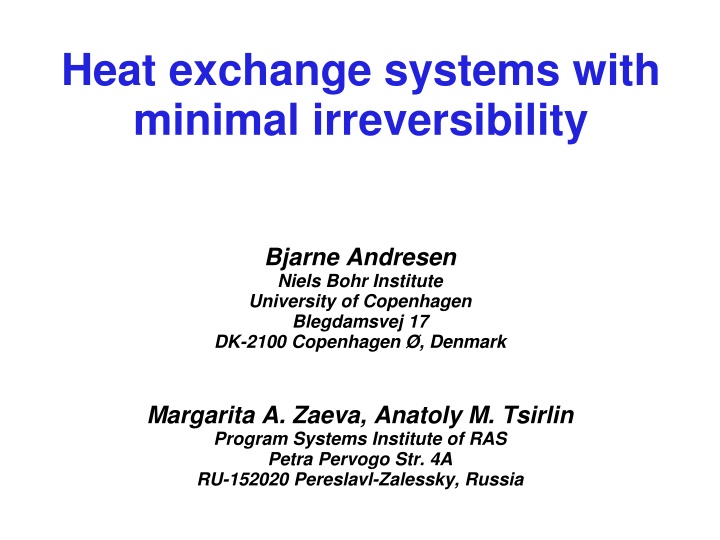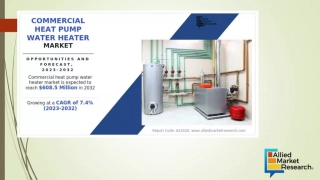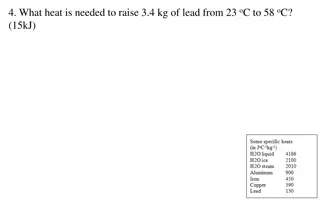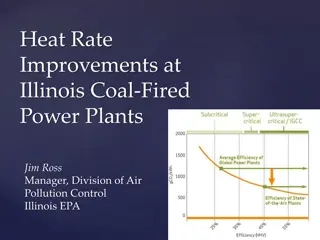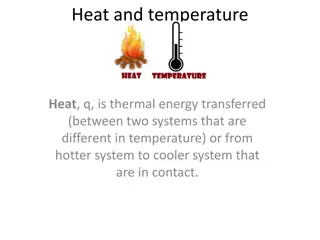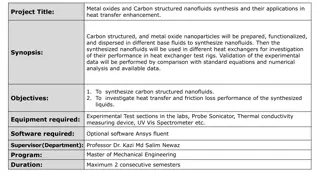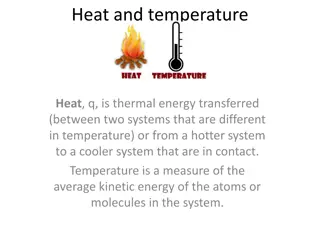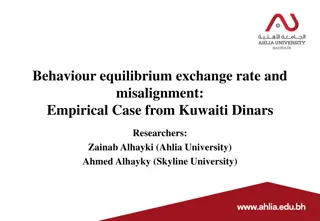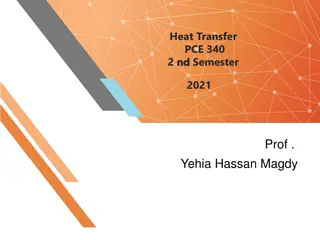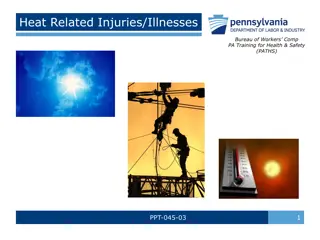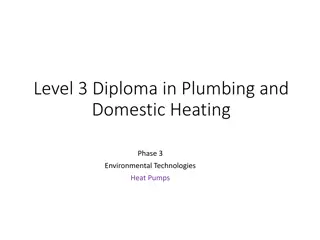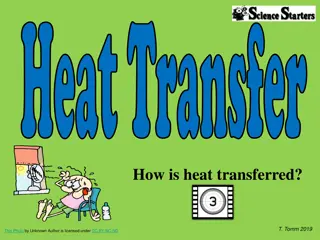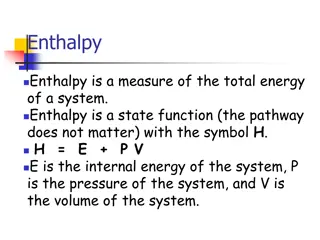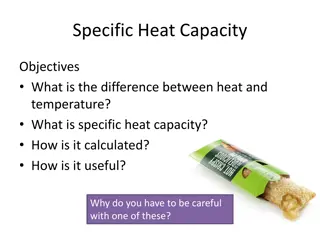Optimizing Heat Exchange Systems with Minimal Irreversibility
In the field of finite-time thermodynamics, minimizing entropy production in heat exchange systems is crucial to reduce exergy loss. Tsirlin's approach focuses on finding the least lossy design by optimizing heat conductance, capacity rates, and heat load while considering various streams and phase changes. The reformulation of the problem involves minimizing entropy production rate by adjusting heat flow and local conductances. By exploring these concepts, engineers can enhance the efficiency of heat exchange systems.
Uploaded on Feb 23, 2025 | 3 Views
Download Presentation

Please find below an Image/Link to download the presentation.
The content on the website is provided AS IS for your information and personal use only. It may not be sold, licensed, or shared on other websites without obtaining consent from the author.If you encounter any issues during the download, it is possible that the publisher has removed the file from their server.
You are allowed to download the files provided on this website for personal or commercial use, subject to the condition that they are used lawfully. All files are the property of their respective owners.
The content on the website is provided AS IS for your information and personal use only. It may not be sold, licensed, or shared on other websites without obtaining consent from the author.
E N D
Presentation Transcript
Heat exchange systems with minimal irreversibility Bjarne Andresen Niels Bohr Institute University of Copenhagen Blegdamsvej 17 DK-2100 Copenhagen , Denmark Margarita A. Zaeva, Anatoly M. Tsirlin Program Systems Institute of RAS Petra Pervogo Str. 4A RU-152020 Pereslavl-Zalessky, Russia
Tsirlins approach to optimization Min dissipation vs. max speed: Finite-time thermodynamics (FTT). Min exergy loss = min entropy production. Q: Without specifying engineering details, find the least lossy design: Which conditions must be met by the heat exchange system such that the production of entropy in it (and hence the loss of exergy) is minimal under the given restrictions? Many previous attempts under different assumptions, e.g. Tondeur, Kvaalen (1987): const rate of entropy production Tsirlin, Mironova, Amelkin, Kazakov (1998): arbitrary kinetics Tsirlin, Kazakov, Kolinko (2003): micro-economics Pinch analysis [Linnhoff, Hindmarsh (1983)] via (T,Q) plots assuming fixed size heat exchangers. I.e. components off the shelf. By contrast we assume fixed total amount of heat exchange capability. I.e. new component designs.
Simple heat exchanger x x F(x) T(x) all monotonic functions of x q(x) heat transfer rate distance along path heat exchange area temperatures
Problem Objective: min entropy production rate * Given: total heat conductance Ktot total heat load Qtot some inlet and outlet temperatures Tin/out Varying: local heat conductances K local heat capacity rates W=g C Allowing: multiple streams phase change
Thermal conductance Heat flow q(T+, T_) = k z(T+, T_) (monotonic in T+and T_) e.g. Newtonian z(T+, T_) = T+- T_ z(T+, T_) = 1/T_ - 1/T+ z(T+, T_) = T+4- T_4 Fourier radiative
The trick Change of variables all monotonically dependent: distance along HX area covered heat transfered heat conductance passed cold flow temperature x F Q K T_
Reformulation of the problem Then dQ/dT_ = W_ dQ/dT+= -W+ and the problem reduces from ???? 1 ? 1 minimize = ? ?(?+,? ) ?? ?+ 0 ???? ???? given ?(?)?? = ???? and ? ? ?+,? ?? = ???? 0 0 to ???? 1 ? 1 minimize = ?? ?+ 1 0 ???? ?? ??+ ??= ?? ??= 1 given = ???? and and ? ?+,? ?+(?) ? (?) 0
Phase change liquid condense / evaporate gas In each stage the heat capacity rate is constant but they usually will differ.
Multi-stream heat exchange systems An equivalent stream (cold or hot) is a stream whose heat capacity rate at each temperature is equal to the sum of the heat capacity rates of all cold or hot streams having the same temperature. Definition. Two heat exchange systems are thermodynamically equivalent if they have the same inlet and outlet stream temperatures, total heat loads Q, total thermal conductivity coefficients K, and entropy production . Theorem. For any law of change in the temperature of the hot stream T+(Q) > T (Q), the calculated two-stream system is thermodynamically equivalent to a multi-stream system consisting of n heat exchangers, in each of which the ith cold stream contacts the ith hot stream (under obvious conditions of energy conservation). The number of heat exchangers is at most equal to the number of streams with fixed parameters. The composite HX curves [T(Q)] are similar to those of pinch analysis but we optimize the whole setup rather than record ad hos choices.
Multi-stream systems procedure Consider for calculational purposes a dual-stream heat transfer system in which the cold stream has a variable heat capacity rate and is equivalent to the cold streams of the multi-stream system being synthesized. Write down the conditions under which the designed system is thermodynamically equivalent to a system consisting of dual-stream heat exchangers, each of which receives one cold stream. Solve the problem of minimal dissipation for the calculational dual- stream system. Select the parameters of a multi-stream system (heat loads, heat transfer coefficients, heat capacity rates of controlled streams) so that it is thermodynamically equivalent to the calculated dual-stream system with minimal dissipation.
Conclusions General optimality conditions are derived for a wide range of types of heat exchange dependencies on T (e.g. Newtonian, Fourier, radiative). A total heat transfer coefficient ( HX area ) is available as well as a total heat load (from the utility supplier). Phase change is allowed in the heat exchange streams. The concept of thermodynamic equivalence of multi-stream systems allows a combined optimization of multi-stream counter current heat exchange systems. M. A. Zaeva, B. Andresen, A. M. Tsirlin: Heat exchange systems with minimal irreversibility; Chem. Eng. Res. Design 171, 317 326 (2021).
